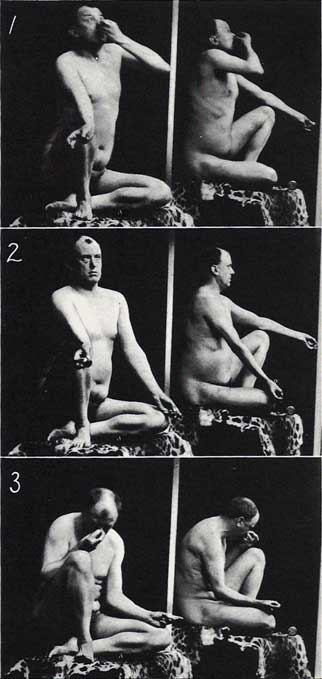Liber RV
vel
Spiritus
sub Figurâ CCVI
A∴A∴
Publication in Class B.
Imprimatur:
N. Fra A∴A∴
- Certain actions induce the flow of the breath through the right nostril (Pingala); and, conversely, the flow of the breath through Pingala induces certain actions.
- Certain other actions induce the flow of the breath through the left nostril (Ida), and conversely.
- Yet a third class of actions induce the flow of the breath through both nostrils at once (Sushumna), and conversely.
- The degree of mental and physical activity is interdependent with the distance from the nostrils at which the breath can be felt by the back of the hand.
Thus let him investigate these statements which follow:
- If Pranayama be properly performed, the body will first of all become covered with sweat. This sweat is different in character from that customarily induced by exertion. If the Practitioner rub this sweat thoroughly into his body, he will greatly strengthen it.
- The tendency to perspiration will stop as the practice is continued, and the body become automatically rigid.
Describe this rigidity with minute accuracy.
- The state of automatic rigidity will develop into a state characterised by violent spasmodic movements of which the Practitioner is unconscious, but of whose result he is aware. This result is that the body hops gently from place to place. After the first two or three occurrences of this experience, Asana is not lost. The body appears (on another theory) to have lost its weight almost completely, and to be moved by an unknown force.
- As a development of this stage, the body rises into the air, and remains there for an appreciably long period, from a second to an hour or more.
Pranayama Properly Performed
[It has been found necessary to show this because students were trying to do it without exertion, and in other ways incorrectly. --- ED.]
1. The end of Purakam. The bad definition of the image is due to the spasmodic trembling which accompanies the action.
2. Kunbhakam. 3. The end of Rekakam.
Let him further investigate any mental results which may occur.
- The dance becomes independent of the will.
- Similar phenomena to those described in 5 (a) (b) (c) (d) occur.
- Certain important mental results occur.
In all proper inspiration the last possible portion of air must be drawn into the lungs.
In all proper holding of the breath, the body must remain absolutely still.
Ten minutes of such practice is ample to induce profuse sweating in any place of a temperature of 17° C or over.
The progress of the Zelator in acquiring a depth and fullness of breath should be tested by the respirometer.
The exercises should be carefully graduated to avoid overstrain and possible damage to the lungs.
This depth and fullness of breath should be kept as much as possible, even in the rapid exercises, with the exception of the sixth practice following.
(This may be combined when acquired with concentration on the Visuddhi cakkra, i.e. let him fix his mind unwaveringly upon a point in the spine opposite the larynx. ED.)
At any stage of breathing let him suddenly hold the breath, enduring the need to breathe until it passes, returns, and passes again, and so on until consciousness is lost, either rising to Samadhi or similar supernormal condition, or falling into oblivion.
The conditions favourable are dry, bracing air, a warm climate, absence of wind, absence of noise, insects and all other disturbing influences,<> a retired situation, simple food eaten in great moderation at the conclusion of the practices of morning and afternoon, and on no account before practising. Bodily health is almost essential, and should be most carefully guarded. (See Liber CLXXXV., Task of a Neophyte). A diligent and tractable disciple, or the Practicus of the Zelator, should aid him in his work. Such a disciple should be noiseless, patient, vigilant, prompt, cheerful, of gentle manner and reverent to his master, intelligent to anticipate his wants, cleanly and gracious, not given to speech, devoted and unselfish. With all this he should be fierce and terrible to strangers and all hostile influences, determined and vigorous, increasingly vigilant, the guardian of the threshold.
It is not desirable that the Zelator should employ any other creature than a man, save in cases of necessity. Yet for some of these purposes a dog will serve, for others a woman. There are also others appointed to serve, but these are not for the Zelator.
(This latter operation is facilitated by severing the frænum linguæ, which, if done, should be done by a competent surgeon. We do not advise this or any similar method of cheating difficulties. This is, however, harmless.)
In this manner the practice is to be raised from the physical to the spiritual plane, even as the words Ruh, Ruach, Pneuma, Spiritus, Geist, Ghost, and indeed words of almost all languages, have been raised from their physical meanings of wind, air, breath, or movement, to the spiritual plane. (RV is the old root meaning Yoni and hence Wheel (Fr. roue, Lat. rota, wheel), and the corresponding Semitic root means "to go". Similarly spirit is connected with "spiral." — Ed.)
